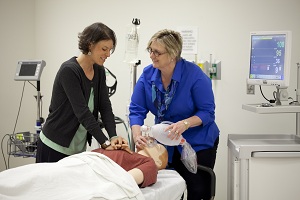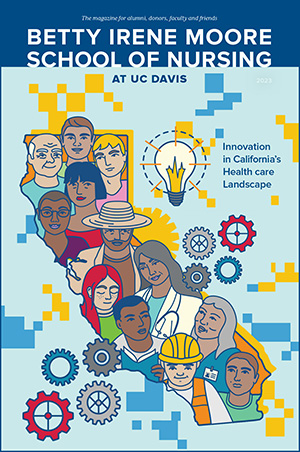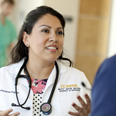Alumni distinction
School of Nursing alumni collaborate to promote high-quality cancer care

School of Nursing Alumnae Arlette Rogers, left, and Terri Wolf, right, review nursing best practices using a mannequin at the UC Davis Center for Virtual Care.
Equipped with enhanced leadership skills and education regarding system-level challenges in health care, the first graduates of the Betty Irene Moore School of Nursing now put their new knowledge and skills into action in their workplaces and communities.
In doing so, the school’s first alumni are actualizing the vision of the school—to develop transformative leaders and form innovative partnerships to transform health-care and improve health.
“The alumni have built an incredible network,” said Deborah Ward, associate dean for academics. “As our family of students grows, these connections will only become larger and more diverse.”
One example of these new partnerships is the collaboration between School of Nursing graduate Terri Wolf, who is the nursing and quality coordinator at the UC Davis Cancer Care Network, and graduate Arlette Rogers, an infusion nurse at the Gene Upshaw Memorial Tahoe Forest Cancer Center in Truckee, Calif.
The Tahoe Forest center is a community-based rural hospital. It is one of four cancer centers affiliated with the UC Davis Comprehensive Cancer Center through the UC Davis Cancer Care Network. The network brings together the academic and research expertise of the UC Davis Comprehensive Cancer Center with the personal relationships and insights of community cancer centers in Northern and Central California.
Since their graduation from the interprofessional Nursing Science and Health-Care Leadership Graduate Degree Program, Wolf and Rogers each took an active role in fostering collaboration through the network to promote high-quality cancer care. Their collaboration supports the delivery of person- and family-centered care, a priority of the School of Nursing and of UC Davis Health overall.
“It’s wonderful to have the support and partnership of other School of Nursing alumni as we embark on the next stage in our careers and put what we learned into practice,” Wolf said. “It’s amazing to see how my former classmates and peers are taking on leadership roles within their work environments. We share resources and support each other.”
This was Wolf’s first year on the job as the network’s nursing and quality coordinator—a new position and she applied her newly minted leadership skills in numerous ways.
For instance, in fall 2012, Wolf leveraged an existing training for UC Davis infusion nurses at the new and cutting-edge UC Davis Center for Virtual Care to create a training opportunity for nurses from the network’s affiliate centers. Fourteen nurses, including Rogers, from affiliate cancer centers participated, in addition to 35 infusion nurses from UC Davis. It was the first time that nurses from across the network trained together.
During the training exercises, nurses responded to patient simulators—computerized mannequins that breathe and respond to treatment as if they were real patients—programmed to exhibit the signs and symptoms of anaphylactic shock. Anaphylactic shock is a rare but serious allergic reaction that can occur while an individual is receiving chemotherapy. If the condition is not treated quickly and appropriately, it can be fatal.
“The training illustrates UC Davis’ philosophy of sharing knowledge,” Wolf said. “We have tremendous academic and clinical resources here and we opened our doors to our network affiliates so that knowledge and best practices can be disseminated on a wider basis throughout California.”
Rogers found the training so useful that she and a colleague implemented the educational opportunity with an interprofessional group of clinicians at the Tahoe Forest cancer center. They enacted the mock anaphylactic shock scenario so clinicians in Truckee could benefit from practicing their response to this crisis situation in real-time.
“These are emergency situations, but we don’t see them very often,” Rogers said. “The training reinforced how we communicate and what our resources are. It’s something staff would like to repeat every six months.”
While the Tahoe Forest center has policies and procedures in place to govern such emergency situations, doing a dry run provides an enhanced level of preparation, Rogers said.
“It’s important to practice outside of our silos, both between disciplines but also to work outside the silos of our own institutions,” Rogers said. “We learn from each other.”
The training is just one example of how School of Nursing alumni are leading new kinds of collaborations to improve health care. For example, Wolf initiated weekly phone calls between the network staff and nurse leaders at the affiliates to talk about areas for collaboration and to provide leadership coaching and support for network colleagues.
Wolf also collaborated with colleagues from UC Davis Medical Center and Mercy Medical Center in Merced to launch a pilot mentoring program that brings together experienced oncology nurses from UC Davis with inpatient nurses from Mercy Medical Center.
“Inpatient nurses in smaller, rural hospitals do not see cancer patients as frequently as the oncology nurses at large academic hospitals like UC Davis Medical Center, where there are dedicated floors for cancer care,” Wolf said. “This program forges connections and shares expertise between nurses who see oncology patients all the time and those for whom cancer care is just one part of their job.”
The affiliate nurses shadowed UC Davis Medical Center nurses to gain a deeper understanding of inpatient oncology, including chemotherapy administration, and the complex needs of cancer patients. Wolf launched the pilot program as a research project, so she will analyze and evaluate the impact at the conclusion of the program.
Wolf also plans to host a leadership summit next year for nurse managers and leaders across the cancer care network as part of her efforts to promote quality care by fostering effective leadership at all levels of health systems.
While Wolf has been in this new role for less than a year, her leadership abilities were on display from her first day, said Kay Harse, the manager of the network.
“Terri’s emphasis on getting in on the ground level and just assessing what is taking place at the affiliate centers has allowed our partners to feel comfortable opening up and sharing their learning needs,” Harse said. “Her leadership is helping us to go beyond just thinking about the traditional definitions of medical quality and standards when it comes to cancer care, and to really take a broader perspective regarding what truly defines high-quality cancer care.”





